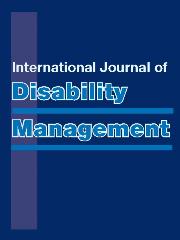No CrossRef data available.
Article contents
Nigeria is a highly multicultural and multilingual society and is divided along class lines and in between these lines are less privileged disabled people who often suffer the most
Published online by Cambridge University Press: 12 November 2014
Abstract
Nigeria is made up of not less than 250 divergent ethnic nationalities and since independence in 1960 has had no success in reducing social inequality, social injustice and achieving even development, especially as it affects the disabled in our society. Furthermore, the neglect of the disabled is deliberately nurtured and sustained by the activities of the government, the ruling class and certain dominant social groups.
This presentation will contend that if the existing widening gap between the rich and poor remains unchecked, the long term implication will be widespread instability that will lead to further disadvantage of the less privileged (including the disabled) in Nigeria. Although the future does not look bright, there are certain measures that can be put in place that can form the bedrock for instituting a society where every individual is recognised, nurtured, their full potential is developed and are given equal opportunity.
- Type
- Abstract
- Information
- Copyright
- Copyright © The Author(s) 2014




